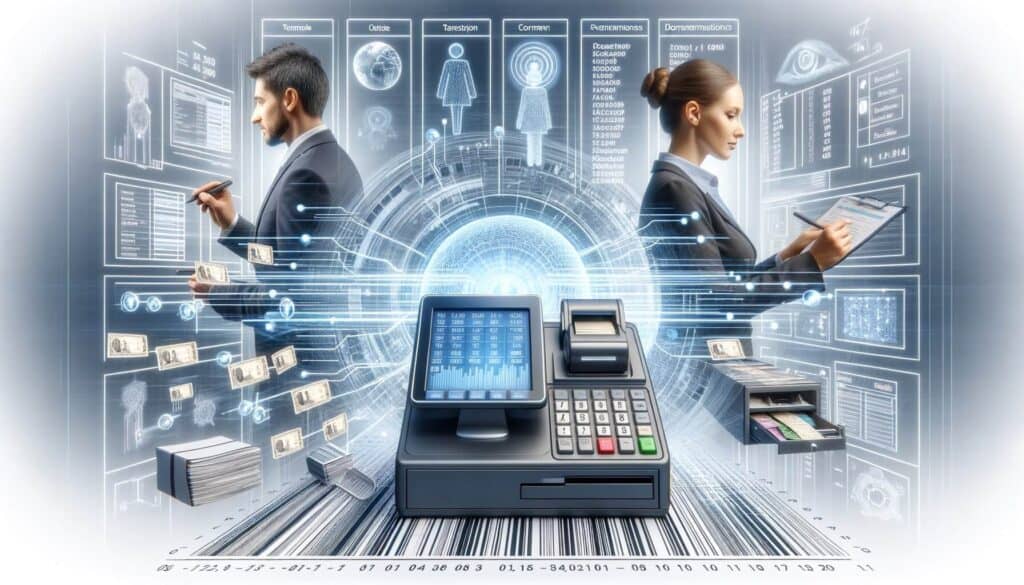
By Mollie Mills April 26, 2025
In today’s fast-paced business environment, having an efficient and reliable point of sale (POS) system is crucial for the success of any retail or hospitality establishment. A POS system is a combination of hardware and software that allows businesses to process transactions, manage inventory, and analyze sales data.
This comprehensive article will explore the numerous benefits of POS systems, including streamlining operations, enhancing customer experience, increasing efficiency and accuracy, managing inventory, analyzing sales, integrating online and offline sales, improving security and fraud prevention, and customization and scalability. Additionally, we will provide a detailed guide on choosing the right POS systems for your business.
Streamlining Operations with POS Systems

One of the primary benefits of implementing a POS system is the ability to streamline operations. With a POS system, businesses can automate various tasks, such as processing transactions, managing inventory, and tracking sales. This automation eliminates the need for manual data entry, reducing the chances of human error and saving valuable time for employees.
Additionally, a POS system can integrate with other business tools, such as accounting software and customer relationship management (CRM) systems, further streamlining operations and improving overall efficiency.
POS systems also simplifies the checkout process for both customers and employees. With features like barcode scanning and integrated payment processing, transactions can be completed quickly and accurately. This not only improves customer satisfaction but also allows employees to serve more customers in less time, increasing overall productivity.
Furthermore, POS systems can help businesses manage employee schedules and track employee performance. By integrating with a time clock system, businesses can accurately record employee hours and generate payroll reports. This eliminates the need for manual time tracking and reduces the chances of errors or discrepancies in employee pay.
Enhancing Customer Experience through POS Systems

In today’s competitive market, providing an exceptional customer experience is essential for businesses to thrive. A POS system can play a significant role in enhancing the customer experience by providing a seamless and personalized shopping experience.
With POS systems, businesses can easily access customer information, such as purchase history and preferences. This allows employees to provide personalized recommendations and offers based on the customer’s previous purchases, creating a more tailored shopping experience. Additionally, a POS system can enable businesses to implement loyalty programs and reward customers for their repeat business, further enhancing customer satisfaction and loyalty.
Furthermore, POS systems can facilitate efficient and accurate order management, particularly in the hospitality industry. With features like table mapping and order modifiers, businesses can ensure that orders are accurately taken and promptly delivered to the kitchen or bar. This reduces the chances of errors or delays in order fulfillment, resulting in a more positive dining experience for customers.
Increasing Efficiency and Accuracy with POS Systems

Efficiency and accuracy are crucial factors for the success of any business. POS systems can significantly improve both by automating various tasks and reducing the chances of human error.
One of the key features of a POS system is its ability to process transactions quickly and accurately. With features like barcode scanning and integrated payment processing, businesses can ensure that transactions are completed accurately and efficiently. This not only saves time for both customers and employees but also reduces the chances of errors in pricing or inventory management.
Additionally, a POS system can automate inventory management, ensuring that businesses always have the right products in stock. With features like real-time inventory tracking and automatic reordering, businesses can avoid stockouts and overstocking, optimizing their inventory levels and reducing carrying costs. This not only improves efficiency but also minimizes the chances of lost sales due to out-of-stock items.
Furthermore, a POS system can generate detailed reports and analytics, providing businesses with valuable insights into their sales performance. By analyzing sales data, businesses can identify trends, understand customer preferences, and make informed decisions to optimize their operations. This data-driven approach improves efficiency by enabling businesses to focus on products and strategies that generate the most revenue.
Inventory Management and Tracking with POS Systems

Effective inventory management is crucial for businesses to optimize their operations and maximize profitability. A POS system can greatly simplify inventory management and tracking, ensuring that businesses always have the right products in stock.
With a POS system, businesses can track inventory in real-time, allowing them to know exactly how many units of each product are available at any given time. This eliminates the need for manual inventory counts and reduces the chances of stockouts or overstocking. Additionally, a POS system can automatically update inventory levels as sales are made, ensuring accurate and up-to-date inventory information.
Furthermore, a POS system can automate the reordering process, ensuring that businesses never run out of stock. By setting up reorder points and automatic purchase orders, businesses can streamline the procurement process and avoid the hassle of manual reordering. This not only saves time but also reduces the chances of lost sales due to out-of-stock items.
Analyzing Sales and Generating Reports with POS Systems
Analyzing sales data is essential for businesses to understand their performance, identify trends, and make informed decisions. A POS system can generate detailed reports and analytics, providing businesses with valuable insights into their sales.
With a POS system, businesses can generate reports on various aspects of their sales performance, such as total sales, sales by product category, and sales by time period. These reports can help businesses identify their top-selling products, understand customer preferences, and optimize their product offerings. Additionally, a POS system can provide insights into sales trends, allowing businesses to adjust their strategies accordingly.
Furthermore, a POS system can integrate with other business tools, such as accounting software and CRM systems, allowing businesses to generate comprehensive reports that provide a holistic view of their operations. By analyzing sales data in conjunction with other business metrics, businesses can gain a deeper understanding of their overall performance and make data-driven decisions.
Integrating Online and Offline Sales with POS Systems
In today’s digital age, businesses need to seamlessly integrate their online and offline sales channels to provide a consistent and convenient shopping experience for customers. A POS system can facilitate this integration, allowing businesses to manage both online and offline sales from a single platform.
With a POS system, businesses can synchronize their inventory across all sales channels, ensuring that product availability is accurate and up-to-date. This eliminates the chances of overselling or disappointing customers with out-of-stock items. Additionally, a POS system can automatically update inventory levels as sales are made, ensuring that businesses have real-time visibility into their stock levels.
Furthermore, a POS system can enable businesses to offer omnichannel fulfillment options, such as buy online, pick up in-store (BOPIS) or ship from store. By integrating with e-commerce platforms and logistics providers, businesses can seamlessly fulfill orders from any sales channel, providing customers with flexibility and convenience. This integration not only improves the customer experience but also optimizes inventory management and reduces shipping costs.
Improving Security and Fraud Prevention with POS Systems
Security and fraud prevention are critical considerations for businesses, particularly when it comes to processing transactions and handling sensitive customer information. A POS system can significantly improve security and reduce the chances of fraud.
With a POS system, businesses can securely process transactions and protect customer payment information. Modern POS systems use encryption and tokenization technologies to ensure that sensitive data is securely transmitted and stored. Additionally, a POS system can integrate with payment processors that comply with industry standards, such as Payment Card Industry Data Security Standard (PCI DSS), further enhancing security.
Furthermore, a POS system can help businesses detect and prevent fraudulent activities. With features like real-time transaction monitoring and fraud detection algorithms, businesses can identify suspicious transactions and take immediate action. This not only protects businesses from financial losses but also safeguards their reputation and customer trust.
Customization and Scalability of POS Systems
Every business is unique, with its own specific requirements and workflows. A POS system should be customizable and scalable to accommodate the specific needs of each business.
A POS system should allow businesses to customize various aspects, such as product categories, pricing, and discounts. This customization ensures that businesses can tailor the system to their specific product offerings and pricing strategies. Additionally, a POS system should allow businesses to create custom reports and analytics, providing them with the flexibility to analyze sales data in a way that is meaningful to their operations.
Furthermore, a POS system should be scalable to accommodate the growth of the business. As businesses expand, they may need to add new locations, increase the number of registers, or integrate with additional business tools. A scalable POS system can easily adapt to these changes, allowing businesses to seamlessly expand their operations without disruptions.
Choosing the Right POS System for Your Business
Choosing the right POS system for your business is a critical decision that can have a significant impact on your operations and profitability. Here are some key factors to consider when selecting a POS system:
1. Business Type and Industry: Different industries have unique requirements when it comes to POS systems. Consider whether you are in retail, hospitality, or another industry, and choose a POS system that is specifically designed for your business type.
2. Features and Functionality: Identify the key features and functionality that are essential for your business. Consider aspects such as inventory management, reporting and analytics, integration capabilities, and customer relationship management. Make a list of must-have features and prioritize them when evaluating different POS systems.
3. Scalability: Consider the future growth plans of your business and choose a POS system that can scale with your needs. Ensure that the system can accommodate additional locations, registers, and users without compromising performance.
4. Ease of Use: A POS system should be intuitive and easy to use for both employees and customers. Consider the user interface and navigation of the system, and choose a POS system that requires minimal training and support.
5. Integration Capabilities: Determine whether the POS system can integrate with other business tools that you currently use or plan to use in the future. Integration with accounting software, e-commerce platforms, and CRM systems can streamline operations and provide a holistic view of your business.
6. Support and Training: Consider the level of support and training provided by the POS system vendor. Ensure that they offer comprehensive training materials, responsive customer support, and regular software updates.
7. Cost: Evaluate the total cost of ownership of the POS system, including upfront costs, ongoing fees, and any additional hardware or software requirements. Consider your budget and choose a POS system that provides the best value for your investment.
FAQs
Q1. What is a POS system?
Answer: A POS system is a combination of hardware and software that allows businesses to process transactions, manage inventory, and analyze sales data.
Q2. How does a POS system streamline operations?
Answer: A POS system automates various tasks, such as processing transactions, managing inventory, and tracking sales, reducing the chances of human error and saving valuable time for employees.
Q3. How does a POS system enhance the customer experience?
Answer: A POS system provides a seamless and personalized shopping experience by allowing businesses to access customer information, provide personalized recommendations, and implement loyalty programs.
Q4. How does a POS system increase efficiency and accuracy?
Answer: A POS system processes transactions quickly and accurately, automates inventory management, and generates detailed reports and analytics, improving overall efficiency and reducing the chances of errors.
Q5. How does a POS system help with inventory management and tracking?
Answer: A POS system tracks inventory in real-time, automates the reordering process, and provides businesses with accurate and up-to-date inventory information.
Q6. How does a POS system analyze sales and generate reports?
Answer: A POS system generates detailed reports and analytics on various aspects of sales performance, allowing businesses to identify trends, understand customer preferences, and make informed decisions.
Q7. How does a POS system integrate online and offline sales?
Answer: A POS system synchronizes inventory across all sales channels, offers omnichannel fulfillment options, and provides real-time visibility into stock levels.
Q8. How does a POS system improve security and fraud prevention?
Answer: A POS system securely processes transactions, protects customer payment information, and helps businesses detect and prevent fraudulent activities.
Q9. How customizable and scalable are POS systems?
Answer: POS systems should be customizable to accommodate the specific needs of each business and scalable to accommodate the growth of the business.
Q10. What factors should be considered when choosing a POS system?
Answer: Factors to consider when choosing a POS system include business type and industry, features and functionality, scalability, ease of use, integration capabilities, support and training, and cost.
Conclusion
In conclusion, implementing a POS system offers numerous benefits for businesses, including streamlining operations, enhancing customer experience, increasing efficiency and accuracy, managing inventory, analyzing sales, integrating online and offline sales, improving security and fraud prevention, and customization and scalability.
By choosing the right POS system for your business and leveraging its features and functionalities, you can optimize your operations, improve profitability, and provide an exceptional shopping experience for your customers.